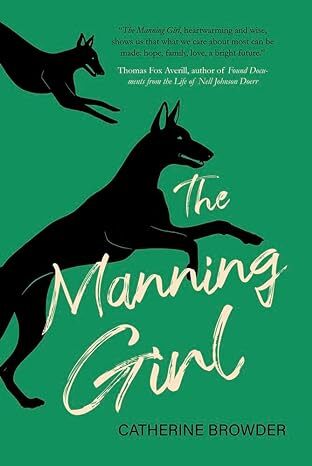The Loving Heart: Catherine Browder’s The Manning Girl

The Manning Girl is an expansive, intimate, and heartwarming book. With focus on a few individuals, Browder draws the readers into a fully realized community and an immediate and contemporary conflict. The current situation begins in 1992, in a rural area outside Topeka, Kansas. A young woman thrusts a baby into the life of Tyler (Moose) Manning. The baby is the illegitimate child of his estranged and wayward brother, Michael, and the too-young mother. Tyler is immediately impassioned by the responsibility and the great wonder of the baby. With the help of neighbors and friends, Bud and Billie Markham, Tyler protects and adores this child as she grows to adulthood.
The chronological story of May—named for the month she was given to Tyler—is beautiful. She’s as winning as any, perhaps every, baby in the world. Ty’s reaction to her is recognizably human. His heart opens to her, and the brief passages of their interaction are touching, the central thread forward. The whole fabric is the backstory woven in, also in brief and vivid sections, revealing the upbringing of Tyler and his brother Michael, their childhood experiences, and other events that might explain their adult personality and behavior. The story includes their legacy from the past, and that is partially May’s legacy, too. The extreme control and orderliness of Ty, and even his many skills, may have a source other than genetic ancestry. The characters discuss then current theories as to what might shape the individual, including cellular response to traumatic experiences. One character questions: “Were people born bad or made so, somehow?” The past also serves to contrast May’s upbringing and to highlight her individuality.
The novel has from the beginning realistic edginess, a modern tension. Since May is illegitimate, a logical and stated dread is that one or both biological parents could decide to claim the child or create heartache for her. Her natural father’s unscrupulous actions, vaguely ever present and eventually concretely so, could also bring external forces to hurt the child. There are secrets, too, that readers are privy to and that could cause pain to characters if disclosed in the story. The greatest dread comes from the totally admirable but obsessive concern Tyler has for the infant. His love gives “a hostage to fate” and might presage disaster. It seems impossible that with such a beginning, the novel could flow forward to a happy ending.
There’s so much memorable and touching, many scenes with pointed and poignant messages. One is when May sits by her deceased pet, the canine Rusty, with her hand on him, while his grave is being prepared. Tyler asks what she’s doing and her response is “Keeping Rusty company.” It’s an intuitive love and honor that amazes Tyler. He learns. An incident told in passing is when an old horse is being sold and the present owner insists that the horse’s goat companion be purchased, too, because they’ve been together all their lives. Everything in the community, plants and animals, has implicit value. Too, expectations of gender identity and gender roles are thwarted. Humans are a mystery and can’t be tagged or boxed.
According to Browder, The Manning Girl is a retelling of Silas Marner, by George Eliot, but it is a standalone novel, complete without external reference. Browder is an accomplished playwright and award-winning fiction writer. Her work displays always a delicate objectivity and a dignified view of her characters. Particularly relevant today is the emphasis on the capacity of the human heart—to suffer, to heal, and to love, especially the latter. It’s a most affirming book, and my pleasure to recommend.



